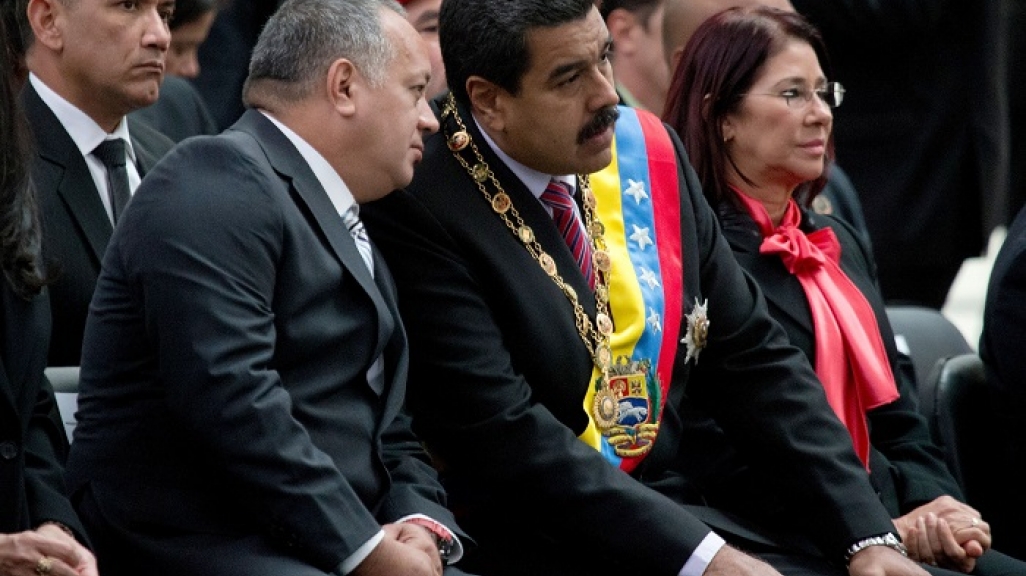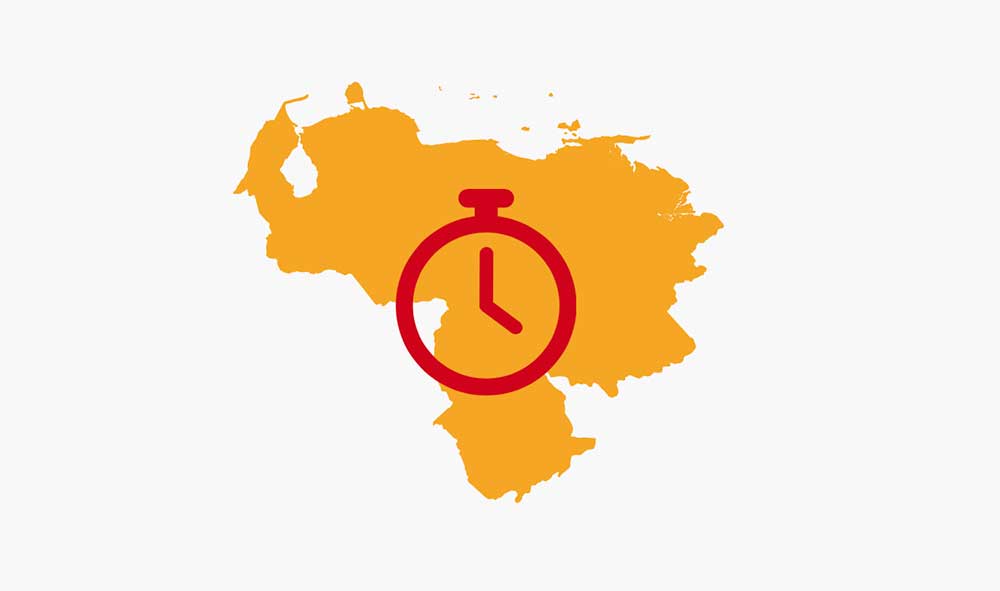Update: What to Know about Venezuela's Escalating Turmoil
Update: What to Know about Venezuela's Escalating Turmoil
On August 4, the newly elected Constituent Assembly moved into the opposition-held National Assembly’s headquarters.
Updated August 2, 2017 — On the morning of Tuesday, August 1, a rare thing happened: “Venezuelan” trended on Twitter in New York City, with the top tweet being about the midnight arrests of two opposition leaders. That news from Caracas should rise above the din of a tumultuous week in Washington is notable but not surprising as the country slips into political turmoil, with the very real possibility of dueling state apparatuses in coming weeks. The chaos is also economic: Venezuelan economist Ricardo Hausmann says that the economic contraction is now worse than the one that hit the United States during the Great Depression.
Here’s a look at the major developments of the last few days, and what to look for in the days and weeks ahead.
What’s Happened since Sunday
July 30: President Nicolás Maduro moves forward with a vote to rewrite the country’s Constitution.
Despite international pressure not to do so, President Nicolás Maduro held a vote on Sunday to elect representatives to a Constituent Assembly amid heightened violence and widespread reports of voter coercion by state forces.
Around midnight on Sunday, the National Electoral Council (CNE) President Tibisay Lucena announced that more than 8 million Venezuelans voted, a tally that would top the 7 million who widely rejected the Constituent Assembly in an unofficial referendum on July 16. But on-the-ground reports and exit polls—and even many chavistas—found that number improbable and put the figure closer to 3.6 million.
On Wednesday, the CEO of Smartmatic, the company that manufactures the voting machines used by the CNE, said the government’s vote total was “manipulated” upward by at least 1 million votes. Reuters also got a hold of CNE data that showed that, by 5:30 p.m. on Sunday, the machines had logged just 3.7 million votes. Voting centers were supposed to have closed by 7 p.m.
More than 40 countries plus the European Union refused to recognize the results of Sunday’s vote.
While the current Constitution of 1999 requires any new magna carta to be approved by popular referendum, Venezuelan legal scholar José Ignacio Hernández says the question of whether a new one will be similarly submitted for popular approval is “irrelevant” since the entire process is fraudulent to begin with.
July 31: The United States issues sanctions on Maduro.
The U.S. Treasury Department’s Office of Foreign Assets Control (OFAC) issued sanctions against Maduro on the afternoon of July 31 for undermining democracy by moving forward with the Constituent Assembly, a body the OFAC says, “aspires illegitimately to usurp the constitutional role of the democratically elected National Assembly.” Maduro joins Zimbabwe’s Robert Mugabe, Bashar Al-Assad of Syria, and Kim Jong-Un of North Korea in the list of heads of state sanctioned by the U.S. government. Maduro is the thirty-sixth Venezuelan to face targeted individual U.S. sanctions, joining Executive Vice President Tareck El Aissami for ties to drug trafficking, Lucena for undermining democracy, and key figures within state oil firm PDVSA for corruption and money laundering.
August 1. Venezuelan secret police arrest opposition leaders in the middle of the night.
In the early hours of the morning on August 1, Venezuelan secret police, known as the SEBIN, arrested opposition leaders Leopoldo López and Antonio Ledezma in their homes. Both are political prisoners who were serving their terms under house arrest. The government had released López—a previous presidential aspirant—to house arrest less than a month ago after being in prison since February 2014. Ledezma, the two-term mayor of Caracas, has been under house arrest since his original detention in February 2015 when he was stripped of his office. In previous days, both men had issued anti-government statements, apparently a violation of their house arrest terms. Ledezma’s message also criticized the Democratic Unity Roundtable (MUD) opposition coalition’s leadership for being less than straightforward with Venezuelans.
Venezuelan bonds are falling, with default probability rising.
Based on credit-default swaps data compiled by Bloomberg on Monday, there is a 62 percent chance the Venezuelan government will default on its sovereign bond payments in the next 12 months, and a 67.5 percent chance PDVSA will miss a payment in the next year, according to Torino Capital. Looking to the next five years, the probability of default for both rises to more than 95 percent. Venezuela and PDVSA face upcoming payments of $4.4 billion through the end of 2017, with more than $3.2 billion of which will come due in October and November.
Investors are unloading many of their holdings in PDVSA, pushing yields up to 152 percent, according to Bloomberg. Returns on some of the bonds that come due in October stood at $0.73 to the dollar on Monday, down from more than $0.85 two weeks earlier when the United States first threatened economic action and from upwards of $0.90 at the beginning of June.
What People Are Watching Now
1. All eyes are on Friday.
August 4 is the day the Constituent Assembly is set to open session—in the National Assembly’s very building, known as the Hemiciclo. According to procedure, the body is supposed to convene within 72 hours of its members' election, but on Wednesday night, Maduro pushed the opening day back from Thursday to Friday.
The powers of this Constituent Assembly are extraordinary, and many expect the body to dissolve the legislature—the only branch of government controlled by a non-chavista opposition since Hugo Chávez won the presidency in 1999. Fresh in people’s minds is a violent episode on July 5 when armed government supporters stormed the Congress and assaulted over a dozen people, critically injuring a congressman. Ambassadors from Colombia, France, Mexico, Spain, and the United Kingdom attended Tuesday’s legislative session in a show of support and solidarity with the beleaguered opposition.
Attorney General Luisa Ortega, a loyal chavista who’s come out criticizing the administration in recent months, is also under fire and fighting to keep her post.
Maduro said in June that he’ll even put his presidency in the hands of the Constituent Assembly, a promise that leaves the door open to the president—whose approval rating fell to 17 percent in the last week—being ousted by chavistas who feel he’s tarnished Chávez’s reputation and legacy.
2. Whether international bodies actually move on Venezuela.
Argentina’s president is lobbying other Mercosur members to expel Venezuela from the bloc after it rejected an offer for mediation. Fellow Mercosur member Uruguay was one of the few notably restrained voices on Sunday’s vote. After several failed attempts to move on a resolution on Venezuela, the Organization of American States could also take up the issue again. The top UN official for human rights expressed concern over violence in recent weeks as well as the arrests of López and Ledezma, though there’s been no further action by the international body thus far.
3. The U.S. could still issue economic sanctions, but likely not a full-out embargo on Venezuelan oil.
Whether the Trump administration still plans to issue economic sanctions—it’d previously threatened “strong and swift economic actions”—remains up in the air. At the July 31 White House press briefing, U.S. Treasury Secretary Steven Mnuchin said: “All options are on the table,” adding later, “Our objective is not to do anything that hurts the people of Venezuela.” The European Union similarly is considering a “range of actions,” which it will likely coordinate with Washington.
Although there were initial rumors that Washington would take what is arguably the harshest measure of banning all oil imports from Caracas, both Democratic and Republican legislators pressured the Trump administration not to do so, citing the negative effects on U.S. business interests. U.S. refineries like Valero, Chevron, and Phillips 66—who together purchase 53 percent of Venezuelan oil imports to the United States—also lobbied against such a ban. Venezuela is the third-largest source of oil for the United States, which imported 780,000 barrels per day from Caracas in the first quarter of 2017, representing 8 percent of total oil imports.
If a U.S. embargo on Venezuelan oil were to go into effect, it would have dramatic consequences for the South American OPEC member: three-quarters of Venezuela’s foreign revenues—or $11 billion of $14.5 billion total estimated oil exports revenues in 2017—come from the United States, according to Inter-American Development Bank economists. Venezuela only makes money off of the 40 percent of its oil it sells to the United States and India, given the rest goes to subsidized exports to Caribbean countries including Cuba or for oil-for-debt deals with others like China and Russia. As of April, Venezuela was behind on at least $65 million in payments to India.
But an oil embargo isn’t the only economic injury that Washington could inflict upon Caracas. Trump administration officials are reportedly considering banning the export of refined U.S. petroleum products to the country. Venezuela currently buys about 80,000 barrels per day from the United States, around 40 percent of which is U.S. light crude that Venezuela uses to dilute its heavy crude before reexporting.
Washington also has yet to issue sanctions against key chavista officials such as the Defense Super-Minister General Vladimir Padrino López, congressional leader Diosdado Cabello (who’ll likely lead the Constituent Assembly), and Maduro’s wife, Cilia Flores. The delay is reportedly intended to keep the door open to future negotiations with the Maduro regime, including as a bargaining chip to secure the release of U.S. citizen Joshua Holt. That said, OFAC did warn on July 26 that any individuals who were elected to the Constituent Assembly would open themselves up to future sanctions; Cabello and Flores both won seats to the Assembly on July 30.
Guillermo Zubillaga contributed to this update.










